Chinese New Year is here. How to celebrate the Lunar New Year and holiday traditions
February is a big month for celebrations — Valentine’s Day, Black History Month, Mardi Gras.
And in case you didn’t know, it's also Lunar New Year, which starts Saturday, Feb. 10.
If you aren’t familiar with Lunar New Year celebrations, here’s what you need to know.
What is Chinese New Year?
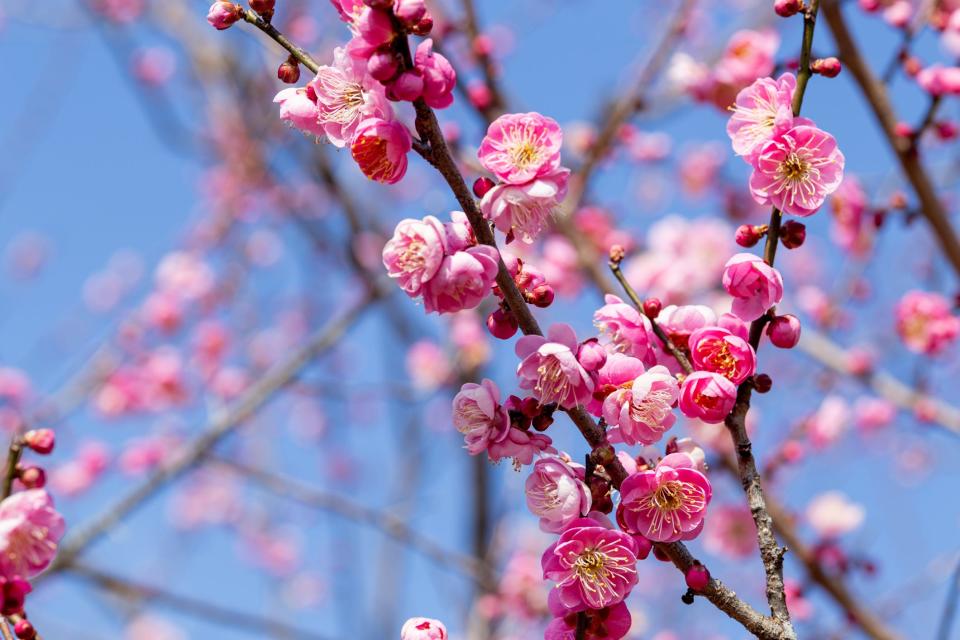
Chinese New Year, also known as Lunar New Year or the Spring Festival, is a 15-day festival typically celebrated in China and other Asian countries that recognizes the start of the new year, similar to New Year’s Eve and New Year’s Day in the United States, according to Britannica.
Lunar New Year celebrates the arrival of spring and, as the most important holiday in China, it is a time of year for reuniting with loved ones.
Each year, Lunar New Year marks the transition between the zodiac signs, with each year said to bear the characteristics represented by its zodiac. Each animal represents one of the 12 stations or signs along the path of the sun through the cosmos, according to History.
Along with the zodiacs, the five elements of earth, water, fire, wood and metal are mapped on the traditional lunar calendar. Each element corresponds to an animal.
Lunar New Year also is a time for admiring the plum blossom, which is a plant that flowers so early in the season that snow is sometimes still on the ground.
What is the Chinese zodiac in 2024?
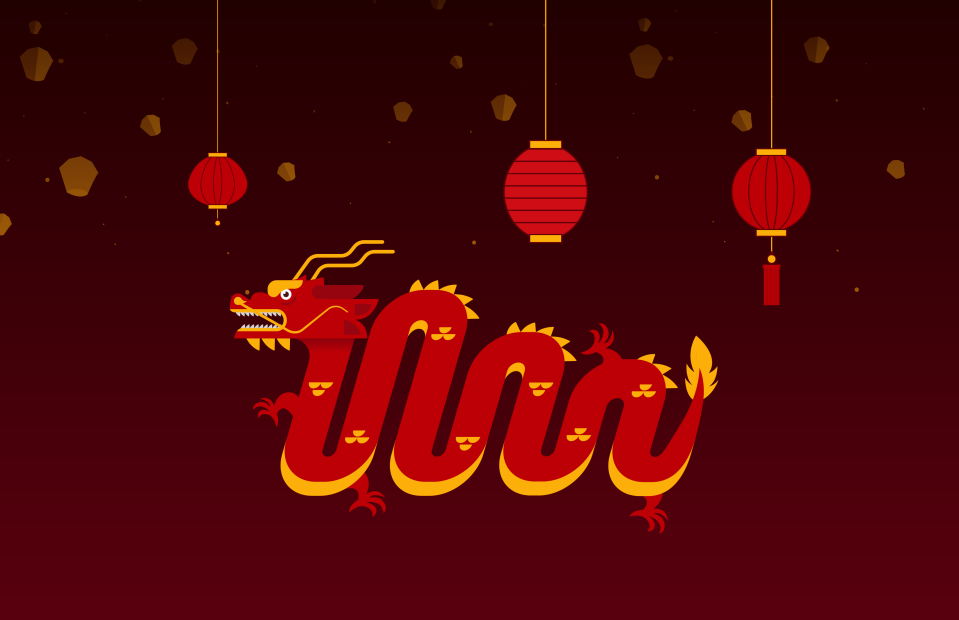
In 2023, the Chinese zodiac was the rabbit, described as quiet, elegant, kind and responsible. 2024 is the Year of the Dragon, said to be confident, intelligent and enthusiastic.
The Year of the Dragon last occurred in 2012.
When is Chinese New Year in 2024?
Lunar New Year is thought to date back to the Shang Dynasty in the 14th century B.C. under Emperor Wu of Han (140 B.C. to 87 B.C.), according to History.
Lunar New Year begins with the first new moon of the lunar calendar and ends on the first full moon of the lunar calendar, 15 days later. The calendar is based on the cycles of the moon, so the dates of the holiday vary slightly each year, with Lunar New Year usually occurring between Jan. 21 and Feb. 20, according to Western calendars.
Celebrate Chinese New Year in Delaware: When will Delaware ring in Chinese New Year in 2024? A look at this year's animal & more
Celebrations last up to 16 days, but only the first seven days are considered a public holiday, according to Chinese New Year.
In 2024, Lunar New Year begins on Saturday, Feb. 10, and culminates with the Lantern Festival on Saturday, Feb. 24.
The 12 Chinese zodiac signs are the Rat, Ox, Tiger, Rabbit, Dragon, Snake, Horse, Goat, Monkey, Rooster, Dog and Pig.
Little Year preparations for the new year begin the week before the holiday, beginning on Feb. 2 this year and last until New Year’s Eve. Preparations for the Lantern Festival begin on Feb. 21.
How is Lunar New Year celebrated?
In the 10 days before Lunar New Year, houses are cleaned to remove any bad luck that might be lingering around, a tradition called “sweeping of the grounds” that opens homes to goodwill and good luck, according to Britannica.
New Year’s Eve and New Year’s Day celebrations traditionally are reserved for family celebrations, including religious celebrations honoring ancestors and lai see, red envelopes family members receive containing small amounts of money.
Fireworks and dances also are prevalent throughout the holiday.
There are many legends surrounding Lunar New Year, which is thousands of years old. A well-known legend is that of Nian, the hideous beast believed to eat human flesh on New Year’s Day that is afraid of the color red. Due to his fear of red, Lunar New Year traditions include loud noises, fire, pasting red paper decorations to doors, burning lanterns all night and lighting firecrackers to frighten Nian away, according to Britannica.
Shopping for holiday items in local markets and having a Lunar New Year’s Eve reunion dinner are commonplace during the holiday. The feast features symbolic dishes like a whole fish, which represents abundance and brings good luck and fortune, according to the National Museum of Asian Art.
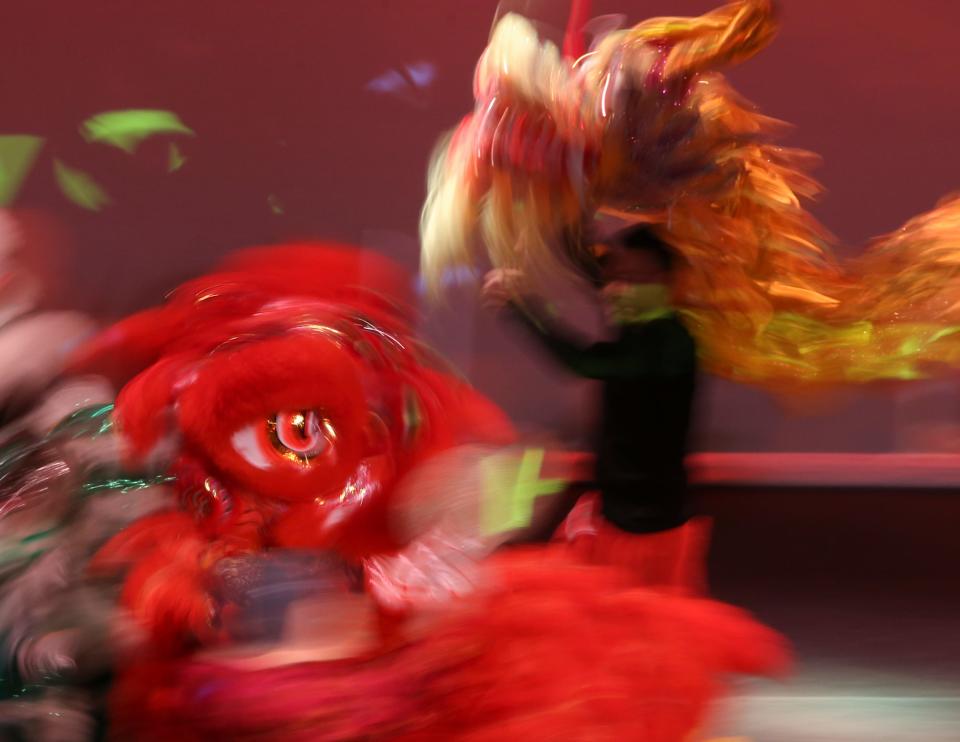
There are also taboos associated with Lunar New Year, according to Chinese New Year:
The use of negative words is to be avoided to prevent bringing misfortune to loved ones or jinxing yourself.
The breaking of ceramics or glass is to be avoided, as it is said to break your connection to prosperity and fortune. If a bowl or plate is dropped, tradition says it should immediately be wrapped in red paper while saying auspicious phrases asking for peace and security. After the holiday, the wrapped shards should be thrown into a river or lake.
Cleaning or sweeping is forbidden after Lunar New Year begins as is showering on New Year’s Day. Cleaning or throwing out garbage during this time is believed to sweep away good luck. If you must sweep, the recommendation is to start at the outer edge of a room and sweep inward. Garbage should be bagged up and thrown away after the fifth day of celebrations.
The use of knives, scissors or other sharp objects is to be avoided, a practice that dates back to older times when it was used to give women of the house a break from daily duties. Sharp objects also are thought to cut your stream of wealth and success in the new year. This taboo means haircutting is not allowed until all festivities are over.
Women traditionally move in with their husband and in-laws upon marriage. According to tradition, a wife should not return to her parents on New Year’s Day, as this signals marital problems and may bring bad luck to the entire family. According to tradition, the wife’s family can be visited on the second day of the new year, with children and a modest gift in tow.
It is believed that debt repayment should not be demanded during the holiday, allowing everyone the chance to celebrate without worry. According to tradition, if you demand a debt to be paid during the holiday, you will bring bad luck to all parties involved. Debt repayment is allowed after the fifth day of the new year. Borrowing money during the holiday also is taboo, as it could result in you having to borrow for the entire year.
Fighting and crying should be avoided and all issues should instead be solved peacefully, ensuring a smooth path into the new year.
Tradition also holds that medicine should be avoided during the Spring Festival to avoid being sick during the entire year. Treating chronic illnesses or serious ailments is OK, but visiting the doctor, undergoing surgery or getting shots during the holiday is thought to bring bad luck, according to ChineseNewYear.net.
There is also a taboo against giving New Year blessings to someone who is still in bed, as it is thought they will be bedridden for the entire year. Similarly, telling someone to wake up signals that they will be rushed and bossed around for the entire year.
New date for parade: Breaking from tradition, Wilmington's St. Patrick's Day parade comes early this year
Lunar New Year traditions
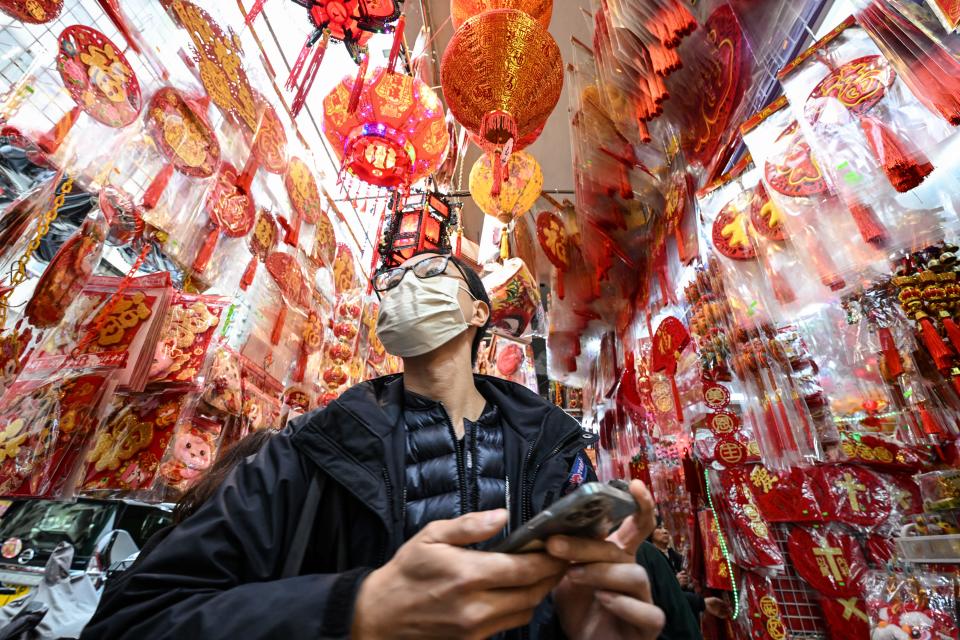
In Chinese cultures, holiday meals feature foods like glutinous rice balls, moon-shaped rice cakes known as New Year’s cake and dumplings, which are sometimes stuffed with a clean coin for good luck, according to History.
Vietnamese celebrations include decorating homes with kumquat trees and flowers such as chrysanthemums, orchids, peach blossoms and red gladiolas. Five-fruit platters are eaten to honor ancestors, with other ritual foods like bánh ch?ng, a rice cake made with mung beans, pork and other ingredients wrapped in bamboo leaves, and m?t t?t, a snack offered to guests that is a sweet bite of dried fruits or roasted seeds mixed with sugar.
In North and South Korea, teokguk, a sliced rice cake soup, are a popular holiday food, thought to start the year with a clean mind and body. In these areas, white and patterned envelopes are used for monetary gifts instead of the red envelopes used in China and Vietnam, according to History.
Held on the last day of Lunar New Year, the Lantern Festival include lighting up houses with colorful lanterns and eating traditional foods such as yuanxiao, sticky rice balls that symbolize family unity; yusheng, raw fish and vegetable salad; and fagao, prosperity cake, according to Britannica.
Children are also known to carry lanterns around neighborhoods at night to mark the end of the festival.
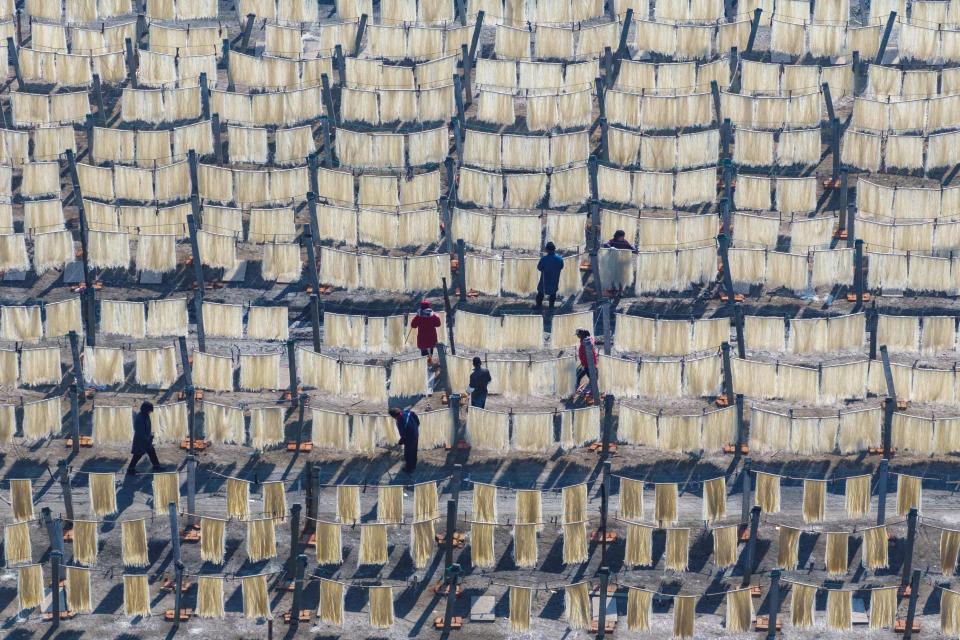
A major tradition of Lunar New Year is to buy new clothes and wear them during the holiday as a sign of renewal. While you can buy them for yourself, they are typically gifted by a relative during the holiday, according to Chinese New Year.
Popular clothing choices for Lunar New Year are traditional items in festive colors, such as:
A tang suit, a mix between a riding jacket and a suit that is made from brocade and has straight lapels, an upturned collar, traditional Chinese knots (frog buttons) and embroidery.
Qipao, tight dresses with intricate embroidery, stiff collars and frog buttons.
Cheongsam, a long shirt or dress that is loose-fitting and usually worn by men.
Hanfu, clothing of the Han, that usually include a shirt with crossed lapels and long, wide sleeves paired with a long skirt.
Headdresses, ornate wands for hairstyles and pendants.
Lunar New Year greetings
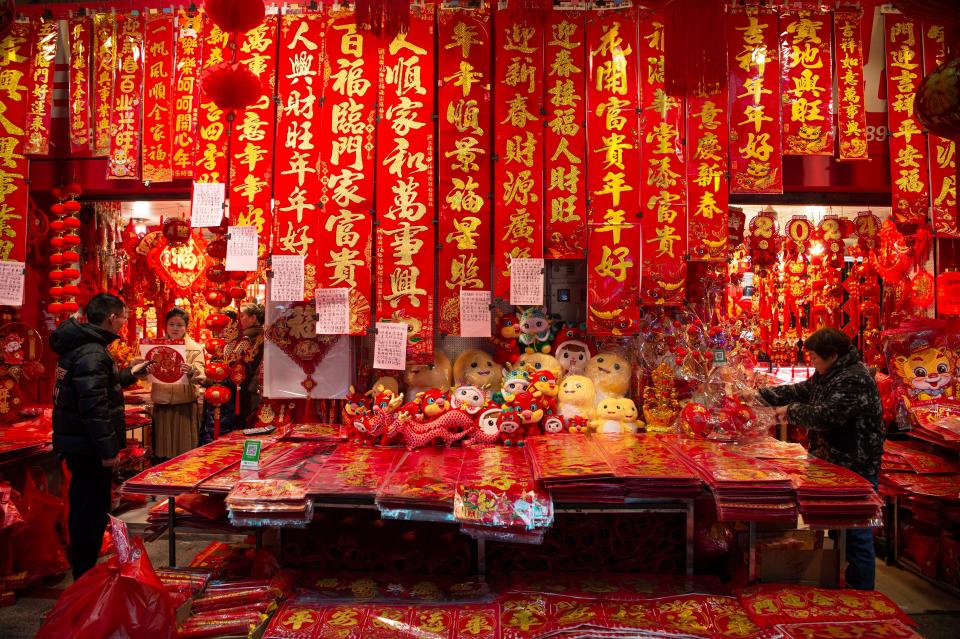
Cultures celebrating Lunar New Year have different greetings for the holiday.
During T?t in Vietnam, traditional greetings are “Chúc M?ng N?m M?i,” meaning “Happy New Year,” and “Cung Chúc Tan Xuan,” meaning “gracious wishes of the new spring.”
In Mandarin, “Xīnnián hǎo,” meaning “new year goodness” or “good new year,” is used to wish close friends and family a happy new year. “Xīnnián kuàilè,” meaning “Happy New Year,” is another greeting that can be used.
South Koreans commonly say “Saehae bok mani badeuseyo,” meaning “may you receive lots of luck in the new year,” for Seollal. North Koreans say "Saehaereul chuckhahabnida,” meaning “congratulations on the new year.”
Got a tip or a story idea? Contact Krys'tal Griffin at [email protected].
Black History Month FAQ: Happy Black History Month! Here's what to know about how it started, the 2024 theme, more
Details on Lent: Wondering when Lent starts in 2024 or how it's observed? We've got answers and more.
Happening soon: What is Mardi Gras? Find that out, plus when to celebrate, why it's a holiday and more
This article originally appeared on Delaware News Journal: What is the Chinese New Year and when is Lunar New Year in 2024